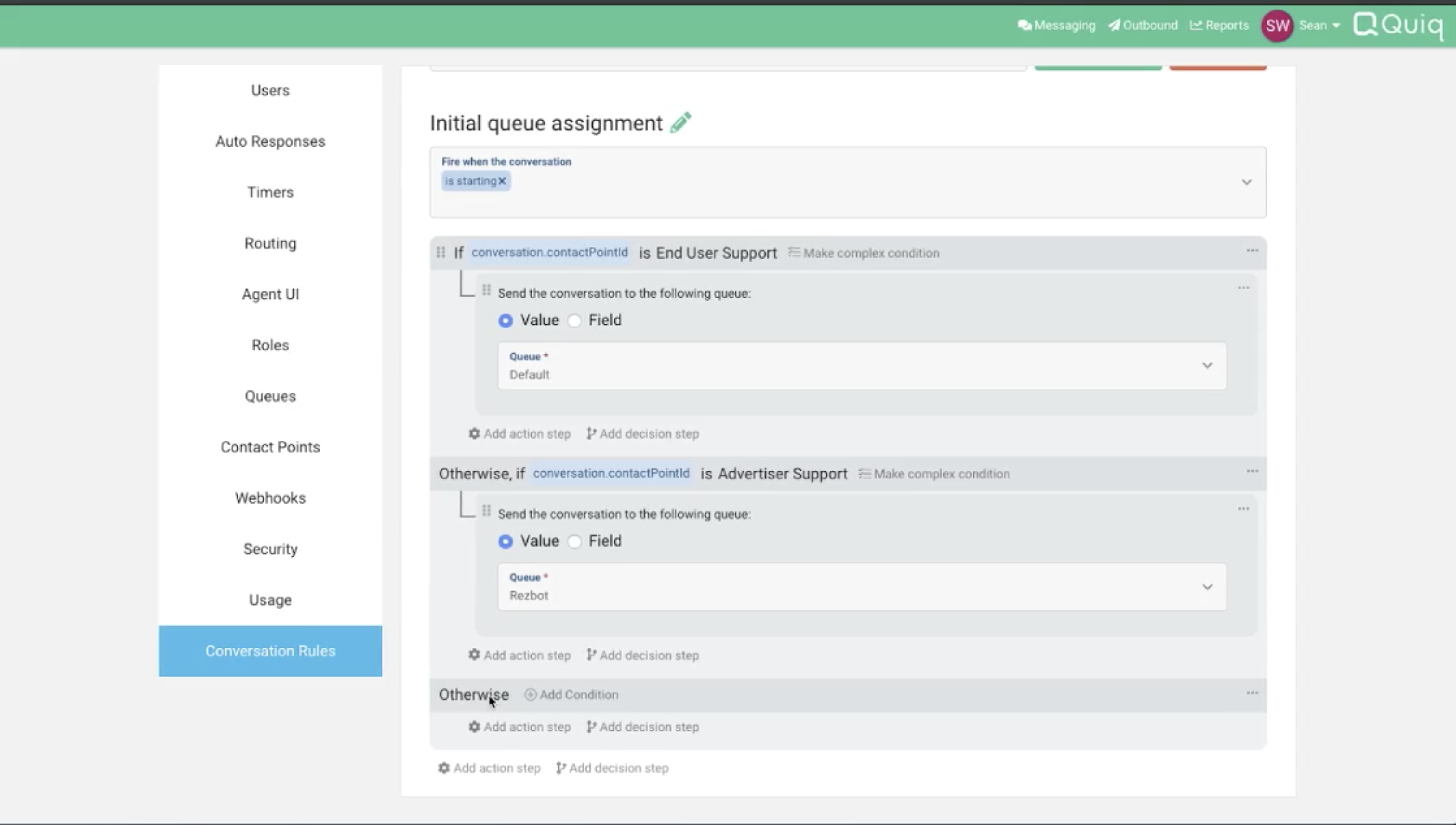Chatbots are alive and kicking. That’s the message from Quiq, an AI-powered conversational platform, which today revealed that it closed a $25 million Series C financing round led by Baird Capital. CEO Mike Myer says that the funding, which had participation from Venrock, Foundry Group and Next Frontier Capital, will be put toward growing Bozeman, Montana-based Quiq’s platform for helping brands engage with customers via text-based bots.
“Quiq was founded in 2015 to solve the huge gap between the way consumers were forced to communicate with their favorite brands and how they preferred to communicate with family and friends,” Myer told TechCrunch via email. “Phone calls are disruptive and time consuming, email is slow and impersonal. Sending a text is how people get stuff done with family and friends. Quiq was [launched] to make it just that easy to communicate with businesses, too.”
Much has been written about the demise of chatbots, which rose to prominence a little less than a decade ago but faded into obscurity as their uptake faltered. A 2019 study by Juniper Research predicted that retail sales resulting from chatbot-based interactions would reach $112 billion by 2023, while Gartner predicted that 15% of all customer service interactions globally would be completely handled by AI, including chatbots, by 2021.

In reality, only an estimated 4% of companies had deployed chatbots as of 2017. But thanks to a proliferation of development tools from Microsoft, Amazon, Google and others, as well as enhanced support for chatbots across platforms such as Facebook Messenger and WhatsApp, chatbots have experienced a resurgence in recent years. The pandemic played a role, too, with staffing shortfalls — and pressure to cut costs — forcing companies to increasingly rely on automation in the customer service department.
Quiq claims that revenue doubled in the past year as the company’s customer base grew to over 200 brands, including Overstock, Spirit Airlines and Brinks Home Security.
“Since the pandemic, overall conversation volume on the Quiq platform has increased 6x and conversations per client have increased 300%. As to why, COVID-19 forced many businesses online and accelerated digital transformation for countless others,” Myer said. “The shifts of the past two years — along with consumer expectations that online shopping should have the same standards of customer care as shopping in a store — have … upended what’s happening in the world of consumer service. Companies that never thought of themselves as global businesses can now compete in overseas markets, and big brands need to provide the same level of personalized care as small merchants.”
Quiq’s platform isn’t strictly chatbot-driven. Rather, it’s designed to let customer service agents work alongside first- and third-party chatbots to respond to requests over popular messaging channels, including Apple Messages for Business. (Apple Messages for Business, launched in 2018 as Business Chat, lets customers communicate directly with businesses via iMessage.) Quiq allows conversations, synchronous or asynchronous, to be escalated to agents if an issue can’t be solved with automation.
Myer asserts that chatbot-augmented messaging offers a number of advantages versus conventional, manual-only (i.e. human) setups. They enable agents to serve multiple customers at the same time, boosting productivity. But perhaps more importantly, they minimize the need to set aside time to make a phone call. According to one survey, what respondents like most about chatbots is that they answer questions quickly and can help outside of a business’ service hours.
Sustained growth
Chatbots can’t triage every type of problem that crops up in customer service — far from it. To take one example, an IBM-powered chatbot deployed two years ago by G.M. Financial, the financial services arm of General Motors, can only resolve about 60% of customer inquiries. (Initially, it resolved less than 10%.) Studies also find that customers dislike addressing important matters with a chatbot, like rescheduling an upcoming medical treatment or discussing financial difficulties.
Indeed, most people have a complicated relationship with chatbots, as illustrated by a January Verint survey of 1,000 consumers. Nearly one-third said that they “rarely” or “never” feel understood by a chatbot while over 30% said they “always” or “often” abandon their efforts to resolve an issue when interacting with a chatbot.
“Chatbots need to move beyond micro-smarts to become intelligent systems that deliver advanced understanding, assistance, and intelligence. ‘Beyond the bot’ conversational AI systems can carry on true contextual conversation, complete with clarifications or a subsequent choice by users,” Verint’s Jen Snell said in a statement accompanying the report. “These supercharged chatbots are supported by deep domain expertise, so their comprehension of user intent goes way beyond generic natural language processing. They are also highly integrated with many systems of record to ensure effective issue resolution and the delivery of the right information.”
But some within the industry remain bullish about chatbots — or, more accurately, their potential. According to a 2019 survey from Forrester, 89% of customer service decision makers believe chatbots and virtual agents are useful technologies for personalizing customer interactions. Juniper, for its part, pegs the operational cost savings from using chatbots in banking alone at $7.3 billion globally by 2023, up from $209 million in 2019.
Investors appear to be convinced. Yellow.ai, a startup developing an AI-driven chatbot platform, raised $78 million in a funding round last August. Chatbot development platform Gupshup — which today announced that it acquired Active.AI, a financial services-focused conversational AI startup — nabbed $100 million in April 2021 at a $1.4 billion valuation.
Having recently acquired e-commerce chatbot vendor Snaps and rolled out automatic language translation for agents, Quiq plans to grow its workforce from 66 employees to 100 by 2023, focusing on marketing and sales. Quiq’s total capital raised stands at $47.5 million.































Comment